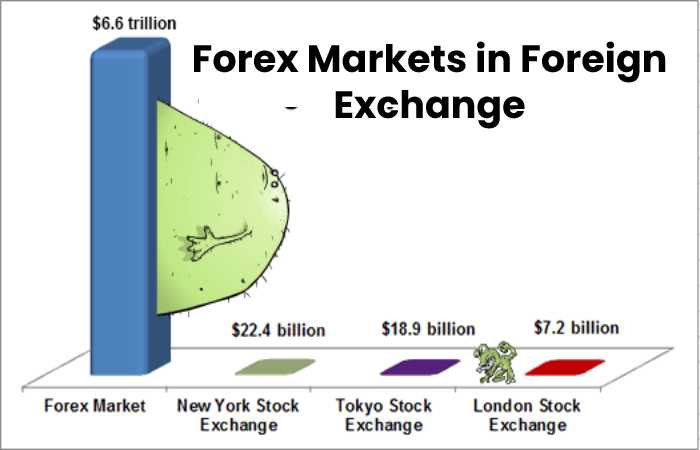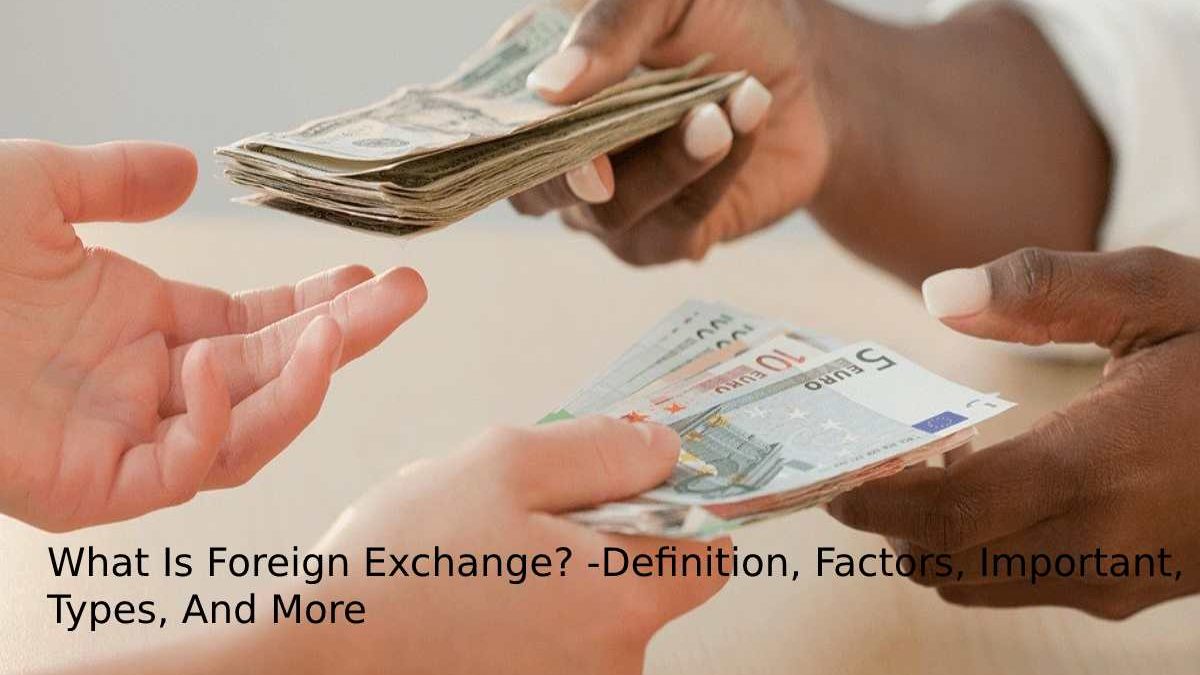Foreign Exchange: Foreign Exchange is the change of one currency into extra at an exact rate known as the foreign exchange rate. The change rates for almost all currencies are repeatedly floating as they are driven by the shop forces of supply and demand.
The US dollar remains the key currency, covering more than 87% of the total daily value traded. The most-traded coins globally are the United States dollar, Euro, Japanese yen, British pound, and Australian dollar.
When India is trading with the United States (US), both INR and USD are involved. If India imports from the United States, it needs to pay in dollars. When the US is importing from India, it would need to bear in rupees. Foreign exchange is also necessary when a country is investing in another. If the US supports India, it has to invest in rupees. Such transactions create a demand for foreign exchange. This is why the foreign exchange market is essential.
Table of Contents
Forex Markets in Foreign Exchange

In foreign exchange markets, currencies are bought and sold. In reality, foreign exchange trade virtually 24X7. Forex is the world’s largest market. Every day, trillions of dollars of transactions. It would also involve institutional investors, forex agents, individuals, and other businesses.
So far, we have discussed the real economy of foreign exchange. There is also a speculative foreign exchange market. Here, money is bought and sold based on speculation. Speculation is based on the value of one currency for another. If dealers believe the value of a currency will go up, they will see more investment. These investments will increase the value of the money.
Factors that Affect Foreign Exchange Rates
Political conditions also significantly impact the forex rate, as events such as political uncertainty and political fights may negatively affect the strength of a currency. The psychology of forex market members can also influence exchange rates.
The Foreign Exchange Market
The foreign exchange market is a devolved, over-the-counter market where all currency exchange trades occur. It is the main and the most liquid market in the world. On regular, the daily volume of contacts on the forex market totals $5.1 trillion, according to the Bank of Global Settlements’ Triennial Central Bank Survey (2016).
The forex market’s major trading centres are in major financial hubs worldwide, including New York, London, Frankfurt, Tokyo, Hong Kong, and Sydney. Despite the dispersed nature of forex markets, the exchange rates existing in the market are the same among its members, as arbitrage chances can arise then. Due to this reason, foreign exchange contacts execute 24 hours, five days a week.
The foreign exchange market is maybe one of the most nearby financial markets. Market participants range from tourists and amateur dealers to large economic foundations and multinational corporations. Many extensive contacts in the market involve requesting various financial instruments, including forwards, swaps, options, etc. Also, the forex market does not only contain a simple conversion of one currency into another.
Importance of Forex when Travelling Abroad
Foreign conversation markets are one of the most important financial marketplaces globally. Their role is of most significant importance in the system of international payments. To play their role efficiently, their operations/dealings must be trustworthy. Responsible is concerned with contractual obligations being honoured. For example, if two gatherings have entered into a forward contract of a currency pair
While going on a trip abroad, one needs to have that country’s currency. If you are going to the United States, you need US dollars. If you are rootless in the UK, you need pounds. They charge you a transaction fee too. It is sensible to exchange your currency at a bank or with an agent. Banks will offer you competitive rates if you are a premium customer. Foreign exchange at the airport should be the last resort as it is the most expensive.
A traveller may also use forex cards. Whether international trade or your summer holiday, forex plays an important role. So, now that you know about foreign exchange read more about what is a forex card and how to use it.
Types Of Foreign Exchange Market
The foreign exchange marketplace, also known as the forex market, is a global market for currencies trading. It is a decentralized market that allows you to buy and sell foreign exchange. The market is over-the-counter, and the foreign argument rates. It involves buying, selling, and replacing currencies at the market rate. Regarding trade rate, forex is the largest in the creation. Let us take a look at dissimilar types of foreign exchange marketplaces.
The Spot Marketplace
In the spot market, transactions linking currency pairs take place. It occurs effortlessly and quickly. The transactions require instant payment at the usual exchange rate, also known as the spot rate. The traders in the commercial market are not bare to the doubt of the demand, which can lead to an increase or failure in the price agreement and trade.
Futures Exchange Market
The transactions in the futures market need future payment and distribution at a previously agreed-upon exchange rate known as the future rate. The transaction or agreement is more formal, ensuring that the transaction terms are set in stone and cannot alter. Traders who conduct the majority of the contacts enjoy a consistent return on the assets even traders with a future market transaction.
Onward Market
The third type of foreign exchange market is the onward market, where deals are like future market transactions. In this case, the parties will sell the terms of the dealings, and the terms agreed upon can be arranged and altered as per the needs of the anxious parties. The forward market has higher flexibility as linked to the futures market.
Swap Market
When there is a concurrent borrowing and advancing of two types of currencies between two investors, it is a swap transaction. Here, one investor borrows cash and pays in the form of a second currency to the second investor. The marketing to pay off their obligations without dealing with a foreign exchange risk.
Option Market
In the selections market, the currency of conversation after one value to the other is upon by the investor at an exact rate and date. The investor has a right to change the money on a future date, but there is no duty.
These are the five kinds of foreign exchange marketplaces in the republic. In short, the market allows easy and quick change of currency from one denomination to another. If you want to start forex trading, open a Demat trading account and start capitalizing—on the transactions in all currencies changes. Globalization has led to a flow in the number of foreign exchange transactions carried out in the year.
Why is Forward Contracting Useful?
Forward contracting is very valuable in evading speculation. The classic situation of hedging request through a forward contract is that of a wheat farmer selling his produce at a known fixed price to remove price risk. Also, a bread factory wants to buy bread ahead to assist in production planning without the risk of price fluctuations.
Some speculators forecast an increase in price based on their knowledge or information. They then go extensive (buy) on the forward market in its place of the cash market. This risk-taker would go long on the forward market, wait for the price to rise and then sell it at higher prices, thus making a profit.
Disadvantages of forwarding Markets
The forward marketplaces come with a few disadvantages.
The Disadvantages are Defined Below in Brief
Lack of centralization of trading
Illiquid
Counterparty Risk
In the first two issues, the fundamental trick is that there is a lot of plasticity and generalization. The forward market is like two-person trade with a real estate agreement against each other. The agreement terms of the deal are as per the convenience of the two persons involved in the agreement.
But the arrangements may be non-tradeable if more participants are involved. Counterparty risk is always interested in the onward marketplace; when one of the two gatherings of the transaction chooses to declare ruin, the other suffers.
An extra common problem in the forward market is – that the larger the old-fashioned over which the bold bond is open, the larger the potential price movements, and the larger the counterparty risk involved. Even in the case of trade in forwarding markets, work has standardized contracts and thus avoids the tricky of illiquidity, but the counterparty risk is continuously leftover.
Conclusion
The FOREX market, also recognized as the Foreign Exchange Market, is a decentralized global marketplace for foreign currency trading. The FOREX market is an OTC marketplace dictated by foreign exchange rates. It also entails selling, purchasing, and exchanging currencies at market rates. The spread, or the difference between buying and selling prices for a currency pair, is where the FOREX commission is limited.

